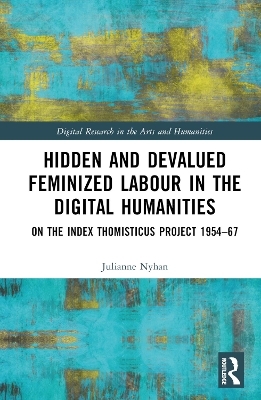
Hidden and Devalued Feminized Labour in the Digital Humanities
Routledge (Verlag)
978-0-367-68596-6 (ISBN)
Through oral history and archival research, Nyhan reveals a hidden history of the entanglements of gender in the intellectual and technical work of the early digital humanities. Setting feminized keypunching in its historical contexts–from the history of concordance making, to the feminization of the office and humanities computing–this book delivers new insight into the categories of work deemed meritorious of acknowledgement and attribution and, thus, how knowledge and expertise was defined in and by this field. Focalizing the overlooked yet significant data-driven labour of lesser-known individuals, this book challenges exclusionary readings of the history of computing in the Humanities. Contributing to ongoing conversations about the need for alternative genealogies of computing, this book is also relevant to current debates about diversity and representation in the Academy and the wider computing sector.
Hidden and Devalued Feminized Labour in the Digital Humanities will be of interest to researchers and students studying digital humanities, library and information science, the history of computing, oral history, the history of the humanities, and the sociology of knowledge and science.
Julianne Nyhan is Professor of Humanities Data Science and Methodology at the Institut für Geschichte, Technische Universität Darmstadt, Germany and Professor of Digital Humanities at UCL, UK. A Fellow of the Royal Historical Society, she was formerly the Deputy- and Director of the UCL Centre for Digital Humanities (2018-2021) and Director of UCL’s MA/MSc in Digital Humanities (2017-2021). Her primary research interest is in the history of digital humanities, an area in which she has published widely.
Introduction; Chapter 1: On the histories of a history: the historical labour models of the Index Thomisticus (with contributions from Melissa Terras); Chapter 2: Hidden tasks, Hidden workers: keypunching the Index Thomisticus; Chapter 3: Situating the Index Thomisticus: views from the inside; Chapter 4. On the need for a "willingness to acknowledge mistakes" constructing the role of the keypunch operator; Chapter 5. On the making of the myth of the lone scholar: digital humanities as aetiology; Chapter 6. Conclusion: On the necessity of recovering the contributions of overlooked and lesser-known individuals to the history of computing in the Humanities
| Erscheinungsdatum | 07.12.2022 |
|---|---|
| Reihe/Serie | Digital Research in the Arts and Humanities |
| Zusatzinfo | 8 Halftones, black and white; 8 Illustrations, black and white |
| Verlagsort | London |
| Sprache | englisch |
| Maße | 156 x 234 mm |
| Gewicht | 630 g |
| Themenwelt | Kunst / Musik / Theater |
| Mathematik / Informatik ► Informatik ► Theorie / Studium | |
| Recht / Steuern ► Privatrecht / Bürgerliches Recht ► IT-Recht | |
| ISBN-10 | 0-367-68596-5 / 0367685965 |
| ISBN-13 | 978-0-367-68596-6 / 9780367685966 |
| Zustand | Neuware |
| Informationen gemäß Produktsicherheitsverordnung (GPSR) | |
| Haben Sie eine Frage zum Produkt? |
aus dem Bereich


